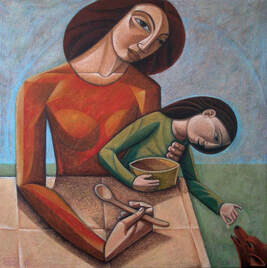 Crumbs of Love, by Michael Cook
Crumbs of Love, by Michael Cook
 Crumbs of Love, by Michael Cook Crumbs of Love, by Michael Cook How do you feel about being called a dog - and/or not quite human, or sub-human, unnatural, intrinsically disordered, not biological, unclean, heathen, pagan, infidel, heretic, wild, rabid, crazy, illegal, alien, or one of the long, long, list of ethnic[1], gendered, and other slurs some continue to endure today? So many people know this only too well. If you have more than one type of marginalised human identities then you may face this even more intensely. Today’s Gospel story puts such ‘dogs’ firmly in the centre of life and faith, in the figure of the one named as a Canaanite woman. Note well: this is someone not even given a name. For denying people’s true names and authentic identities is a game as old as time, and it is still well and truly alive today. Every day, there are people treated like dogs who, at best, can only aspire to the crumbs which fall from the tables of the privileged. This story therefore is still our story as a human race, and the light it brings comes from speaking in crumbs…
0 Comments
Jesus wept. In English, that phrase is the shortest verse in the Bible, although - as ἐδάκρυσεν ὁ Ἰησοῦς - it is not the shortest in the original languages. Nonetheless, what expressive power it has. It is certainly appropriate to recent events. What with the AUKUS deal, with its expensive, and nuclear, submarines; Nazis on the streets of Melbourne; continuing anti-trans violence; right wing Christian attacks on our own community and others; and the latest IPCC report, as if earlier ones were not enough; Jesus wept indeed. This passage has also been on my heart for some time. Not least it came to mind when I saw a recent transport ad. ‘End Extreme Poverty’ it said and it brought me up with a shock. For wasn’t that the cry of other past campaigns in which some of us have shared, such as the Jubilee campaigns to end the debt of poorer countries, and the Make Poverty History campaigns of the ‘noughties’ (2000s) with their vaunted Millennium Goals? At that time, some of us may remember, there was an ecumenical campaign, led by a former colleague of mine, called the Micah Challenge. Meanwhile, working with the National Aboriginal and Torres Strait Islander Ecumenical Commission, I recall being involved in our own Make Indigenous Poverty History campaign, with our own Millennium Goals, several of which have been part of the Closing the Gap initiatives since. As part of that, with an Aboriginal Christian leader, I co-wrote a little reflection on the Gospel story we heard this morning. Yet are we that further forward on many First Nations issues too? Well may we say Jesus wept. Where though is the pathway to life? 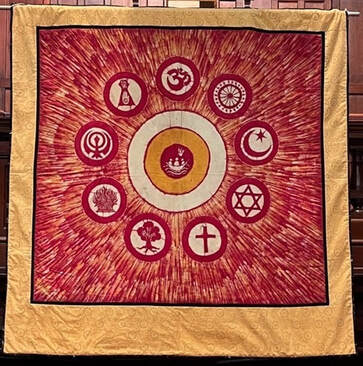 "What's in a name?”, said Juliet: “That which we call a rose. By any other name would smell as sweet.” Shakespeare’s famous lines speak of the power of names and designations. He presents Juliet, on her balcony, musing on the rose as a metaphor, in the context of her love for Romeo and the intense, age-old, conflict between two tribes - the Capulets (Juliet’s mob) and the Montagues (Romeo’s mob). Juliet proclaims that names have no ultimate meaning, other than those which people are willing to give them. As she puts it, in reference to Romeo: “Tis but thy name that is my enemy…. What’s Montague? It is nor hand, nor foot/ Nor arm, nor face. O be some other name/ Belonging to a man.” We do not, says Juliet here, have to be controlled by our names, by our tribes. We can choose how to live with them, and, in love, transcend them. Of course, Shakespeare’s story of the young lovers ends in tragedy. It is challenging to live with, and beyond, our names, our tribal identities. It can bring misunderstanding, opposition, and much worse. Yet is this not the path of true love, in the fullest dimensions of those words? Certainly, as we come today to bless our beautiful new interfaith banner, we do so in awareness of that same call to honour the different names of God, and not to let them control and divide us. For in the depth of all the world’s great wisdom traditions, true love, divine love, is not simply about reaffirming what is valuable in our tribal identities. True love is also about walking paths of inner and outer transformation together… 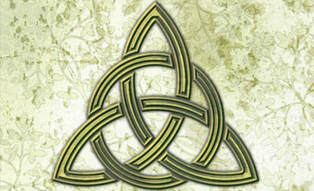 ‘Cheer, cheer, the red and the white/ honour the name by day and by night’ – yes, that is the beginning of the song of the Sydney Swans. To my mind, and I admit my bias as a long-time Swans fan, it is the best of all the AFL club songs. For I won’t name names, but, with all respect, parts of some other clubs’ songs are, well, somewhat embarrassing. However, if Swans supporters are being completely honest, even we/they probably wouldn’t claim our anthem to be the greatest song ever written. I do wonder too, after all the rain we have had, and the consequent problems, whether the line ‘shake down the thunder from the sky’ is all that appropriate to sing right now?! I guess that is the point of what, in the best sense of the word, we might call ‘tribal’ songs. They may not always be perfect. They might even be awkward at times. We may not hold straightforwardly to all the details. We might even want to change some of them – and sometimes manage to make that change: just as the original Sydney Swans line ’while our loyal sons are marching’ was changed, in March last year, to ‘while our loyal swans are marching’, reflecting the emergence of the Swans girls youth program and the Swans women’s team (happily, albeit belatedly, to play in the AFLW later this year). They may also be quite annoying to others, even, after a victory, even a little insulting and enraging perhaps to some. However, despite all their limitations, such tribal songs are part of giving expression to shared experiences of deep connection and community, and to forms of faith and hope. As such, trite though they may be in comparison, I feel that they thus give us one way into approaching the historic ecumenical creeds of the Christian Church… 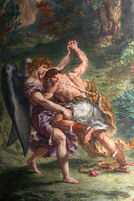 As each of us comes to worship today, how are we going in our lives and faith? Are we ourselves wrestling with challenging things in our lives, and with God? Are we bearing wounds? Are we seeking blessing, or feeling blessed? In what ways are we perhaps ‘God’s Wrestlers’, ‘God’s Wounded’, ‘God’s Blessed’? These are but three different ways of approaching the great Hebrew story we encounter today in our lectionary (Genesis 32.22-31) - the story we may call Jacob’s Wrestling with the Angel, or alternatively, Jacob’s Wounding, or Jacob’s Blessing... 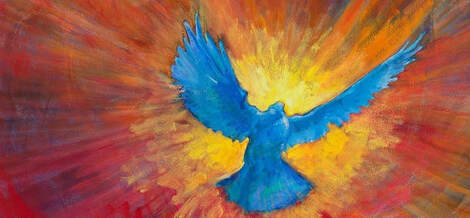 I have been thinking about what it means to be an advocate. The word comes from the law courts and literally means to ‘add a voice to’ – referring to those who would speak and add their testimony on behalf of a defendant. In Latin behind that word is the word vocare – to call or summon, from which we derive our word vocation. It seems to me that advocacy is a core charism and calling here at Milton Anglican. We have for example accepted the call to add our voice to that of the homeless in our area; to allow the voices of those traumatised by their years of war service especially in Afghanistan to be heard; to encourage the voices of creative people especially artists to emerge; to recognize the voices and rights of Aboriginal and Torres Strait Islander Australians and to add our voices to those of the Rainbow community, creating safe space where all can be affirmed and heard... 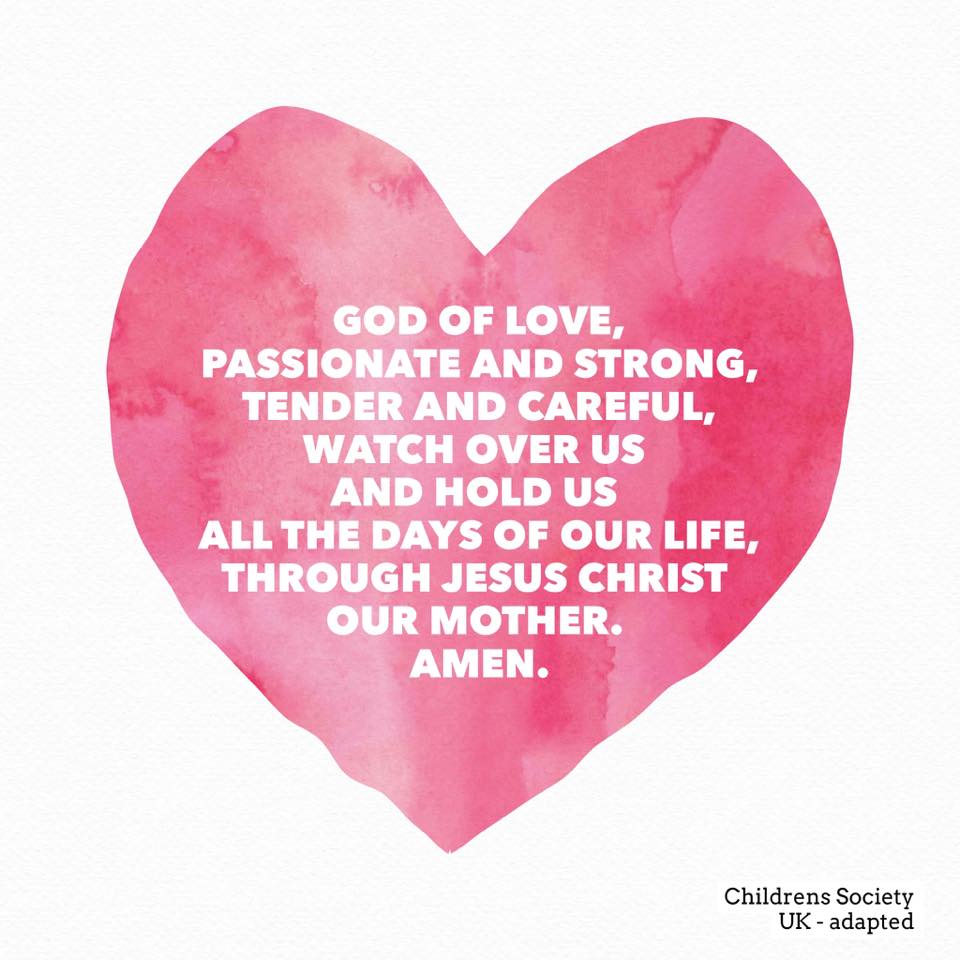 On this Mother’s Day we have a gospel text that has Jesus talk a great deal about the Father! That is only problematic, if we then falsely equate God and fatherhood. God is of course beyond gender and inclusive of all genders. So theologically the writer of John could just as well have written ‘I am in the Mother and the Mother is in me.’ Had they done so, the shape of church life down the centuries might have been a little different! But what they were most concerned about was not the gender of God, but the nature of our relationship with God. On the eve of crucifixion, Jesus is depicted reassuring the disciples that what matters is that we all have our home, our dwelling place in the heart of God and we can trust this no matter what. Our relationship with God is as intimate as that between parent and child; our home in God modeled on earthly hearth and home. When in the 1870s Julia Ward Howe established a Mothers’ Day for Peace, she did so from the passionate belief that relationship is what matters and can make a difference. All mothers raise children for life, and not as cannon fodder for war and destruction. Mothers raise children to maintain relationship and to care for one another. They do so because they understand well that God cares for each human child just like a good mother, with tenderness and equal love, while cherishing their diversity. Mothers indeed provide to their children exactly the gifts that Jesus promises the disciples – life, truth and a pathway to follow. Every human child relies on a mother for the gift of life, nurtured by them in the womb. Those who mother us in later life, whether our birth mothers, or others who tend to us with motherly care, then offer us the gift of truth – the truth of who we are and have the potential to become. No one knows us better than the mother figures in our lives – some of whom of course may be fathers! It is also the role of mothers to offer us pathways, ways to navigate the challenges of life, drawing on their own experience and the pathways shown to them by their own forebears. Many of us will have been helped along the pathway of discipleship by the mothering love we received in Christian community. So today as we give thanks for those who have mothered us, we give thanks too for our relationship with God – a relationship of intimacy and care, in which we receive the gifts of life, truth and ways to walk – the gifts of our true Mother. Amen. by Penny Jones, for Sunday 3 May 2020  Storms about sex and gender increasingly rage around, and, importantly, within us. In the face of this, what stories are we telling ourselves, and living into? How are we negotiating the tempests of faith, fact and false news? Where are we headed and what hope do we have? Let us take time to consider. For the sea of faith of which we are a part is in much turmoil because of sex and gender waves. It is likely to remain so, and even grow more turbulent. What options are among us then, and, most vitally of all, where is God in all of this? 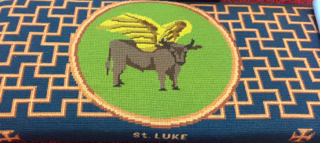 Have you ever noticed how much conflict there is the Bible? I don’t mean so much those horrible stories of war and sanctified violence. I mean conflict between people of faith over issues of understanding God and how to live in this world. Take the writings of St Luke for instance, not least the Acts of the Apostles. If we think we have some lively debates today - over such issues as the valuing of lesbian, gay and gender variant people - that is actually quite in line with the conflicts in the early Church which Luke writes about. It seems that, spiritually speaking, Christians have always had differences about how to relate the eternal truth of Christ to time-bound cultural issues of philosophy and morality. Luke however assures that this is not something to worry about but rather it is an opportunity to be grasped... I have a good friend called Peter Millar who was recently diagnosed with bone cancer. Some of you may remember him, for he visited Toowoomba a few years ago and he is quite a tour de force! Some of you may also know him from his writings. For Peter Millar is a leading member of the Iona Community in Scotland and a former Warden of Iona Abbey and he has contributed prolifically to sharing contemporary faith and engaged spirituality through many books, articles, poems and prayers. Like many contemporary Celtic Christians, he has also woven together a deep life of prayer and faith with commitment to building community locally and across the world, especially with the poor and the marginalised, and the struggles of the wider environment. Most of all, I think, Peter is an amazing person and model of encouragement for so many people, So it is particularly sad to see such personal struggles afflict such a spiritual live-wire, aflame with the love of God. Yet perhaps this is where, as in the sufferings and cross of Jesus, the love of God really comes alive and shines forth its truth….
|
Authors
sermons and reflections from Penny Jones & Josephine Inkpin, a same gender married Anglican clergy couple serving with the Uniting Church in Sydney Archives
June 2024
Categories
All
|
 RSS Feed
RSS Feed